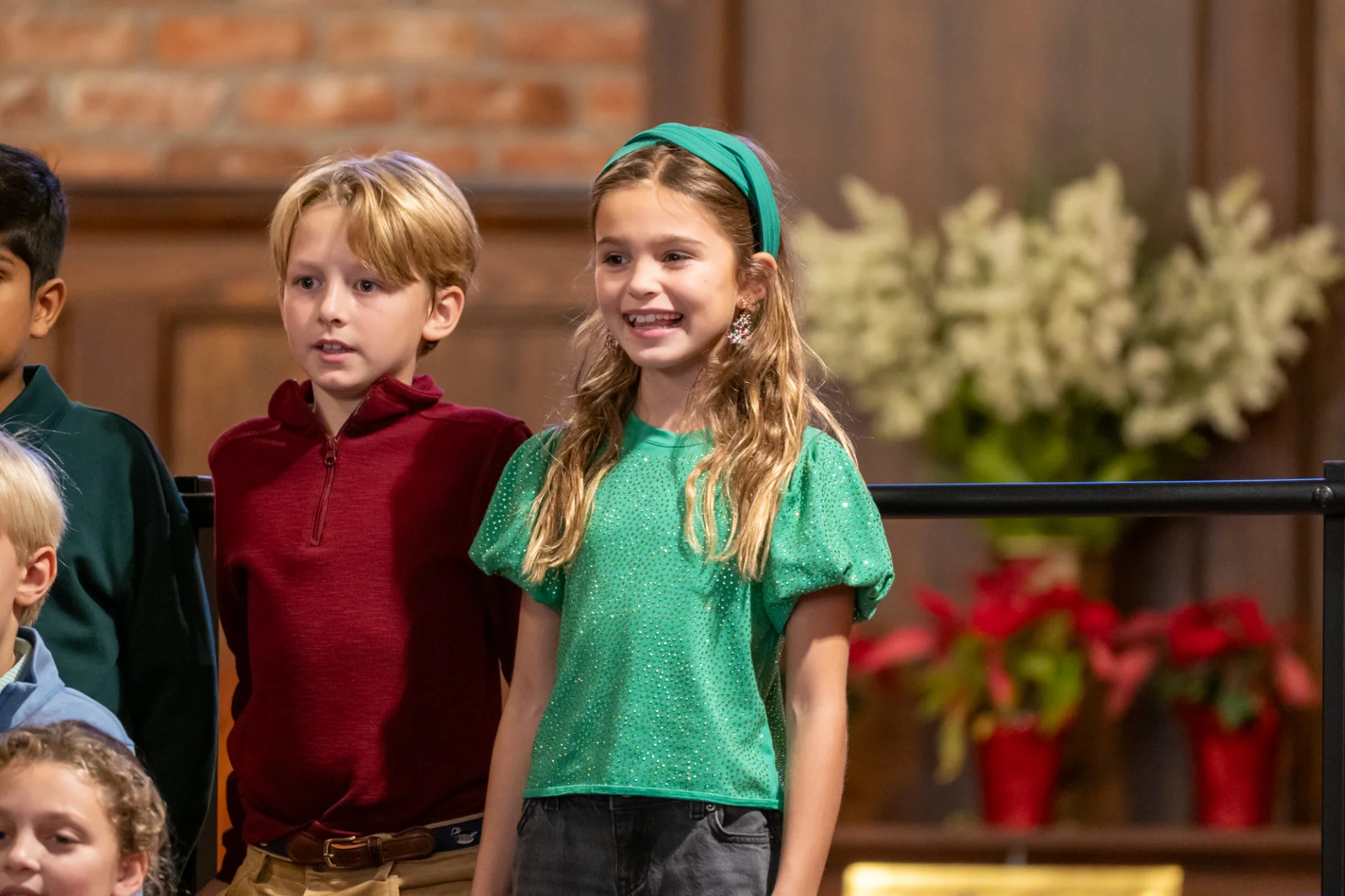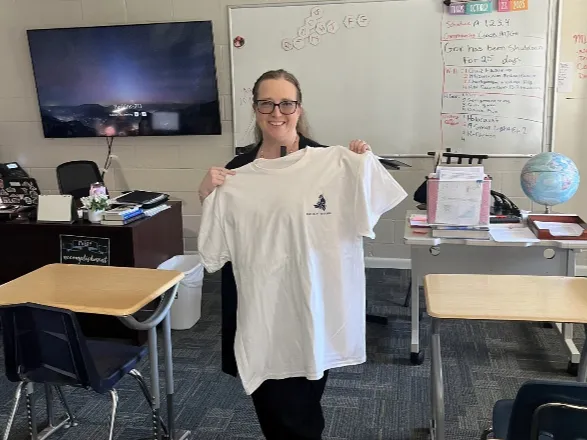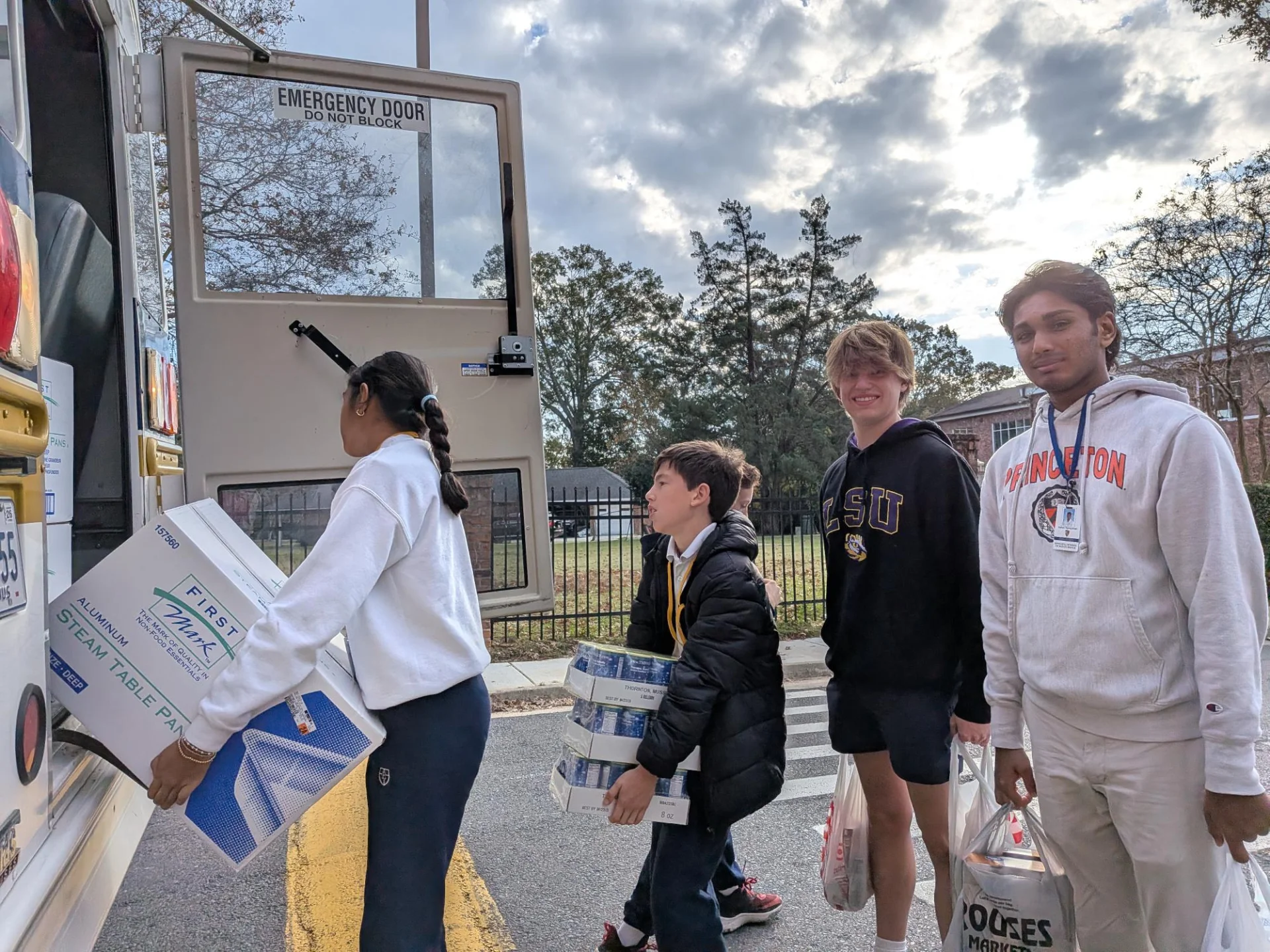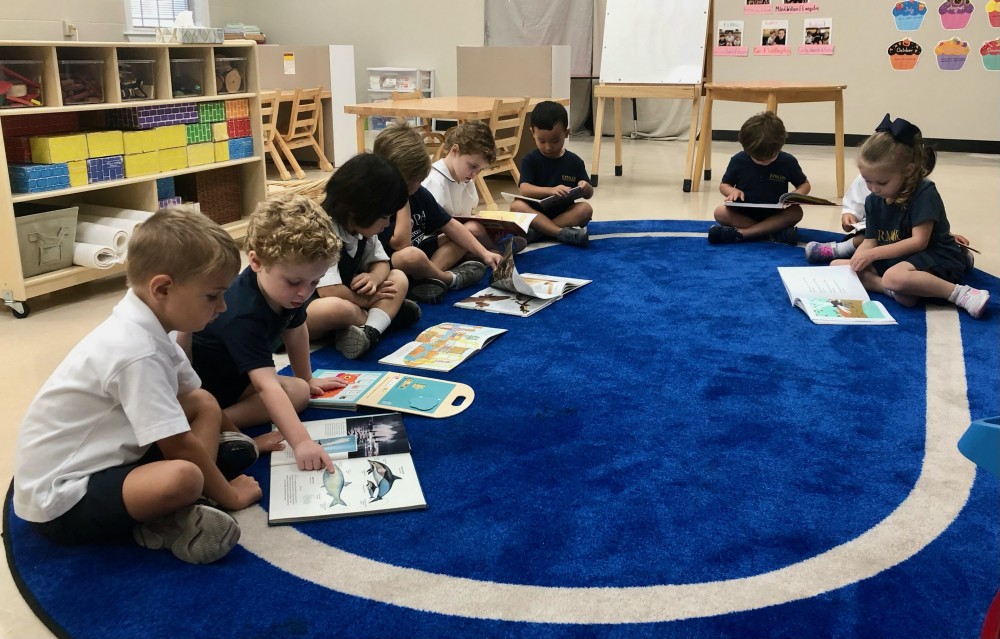- Admission
- Discover Episcopal
- Our Program
- Athletics
- Arts
- Spirituality
- Student Life
- Support Episcopal
- Alumni
- Parent Support
- Knightly News
- Contact Us
- Calendar
- School Store
- Lunch Menu
« Back
We are Reading
August 19th, 2022

A child curls up in a cozy corner, repeating the words of a favorite book she has read at bedtime every night for the past month. At a table next to her, a boy flips through the pages, narrating what he sees in the pictures. But are they really reading? What defines reading? To read anything is to make meaning. Whether we’re reading the room, an expression, or the pages of a book, we are trying to interpret and make sense of what is before us.
In the spring of 2022, the Pre-K teachers participated in a book study exploring ways to bring meaningful reading experiences into their classrooms. “I am Reading,” by Matt Glover and Kathy Collins, examines the ways that adults view children as readers, and offers ways to support reading independence in the classroom. Glover and Collins argue that rushing reading in a traditional sense causes children to miss out on time to establish playful, intentional, self-initiated ways to interact with texts. Providing lots of opportunities for independent reading allows young children to begin seeing themselves as readers and develops their book handling, print awareness, and early comprehension skills.
What Does This Look Like in the Classroom?
Students are given numerous opportunities to foster their independent reading skills in the Pre-K classroom. Teachers model the intonation, rhythm and voice of reading through daily read alouds in their classrooms. After reading a story, books are placed on the bookshelves for children to look at independently in free choice centers or during our school wide D.E.A.R. (Drop Everything And Read) time. The shelves are full of favorite books, as well as new stories with lots of picture support to help children interpret the story and build vocabulary to describe what is happening. Teachers foster growth by observing children as they read, asking questions to prompt higher thinking and deeper understanding, and selecting books to appropriately challenge children to grow their language and pre-reading skills.


What Can You Do at Home?
1. Read aloud and often.
Daily exposure to books promotes children’s early literacy development. Since children listen on a higher level than they read, hearing other readers stimulates growth and understanding of vocabulary and language patterns. When adults read to children, they are modeling the rhythm, fluency, voice and tone of a book. They hear how punctuation affects the pace of the story and how voices change for each character. Read alouds are a great way for children to learn to be a reader.
2. Provide access to books.
Make a cozy book nook in your home that is inviting to your child, with books that are easily accessible. Provide baskets of books for your child to read in the car. Putting books in the hand of a child is the best way to support your young reader.
Book Suggestions for Preschoolers
Alphabet books
Counting books
Familiar picture books
Wordless books
Books with rhythm and repetition
Pop-up books
Non-fiction books
3. Model independent reading.
Set apart time for your family to put down the electronics and read. Children learn from the behaviors that they see modeled by the adults in their lives. Go to the library together and check out books for every member of the family. Spend time together falling in love with reading.



Fostering a love of reading in early childhood, by providing frequent independent reading opportunities early on, can positively impact children’s view of reading, as well as their reading competency as they grow as readers.

Julie Mendes, a 2001 graduate of Episcopal, moved into the role of Director of Early Childhood Programs in 2020 after teaching PreK-4 since 2012. She received both her undergraduate degree and MEd in elementary education at Texas Christian University in Fort Worth, Texas. After teaching second grade in a dual language program in Texas public schools for three years, Julie moved abroad to teach first grade at a bilingual school in Gracias, Lempira Honduras. In her role as Director of Early Childhood Programs, Julie provides leadership and support for early childhood students and teachers.
The Episcopal School of Baton Rouge 2025-2026 application is now available! For more information on the application process, to schedule a tour, or learn more about the private school, contact us at [email protected] or 225-755-2685.
Posted in the categories All, Lower School.
Other articles to consider
 Dec17A Christmas Message from Father Patrick
Dec17A Christmas Message from Father PatrickFather Patrick shares a special message for the season.
See Details Dec12From Service to Song: Lower School Students Celebrate Christmas in Two Languages
Dec12From Service to Song: Lower School Students Celebrate Christmas in Two LanguagesEpiscopal third graders celebrated the season and French heritage with a special holiday program in the Lewis Family Memorial Chapel of the Good Shepherd.
See Details Dec11Upper School Recognizes Excellent Educators
Dec11Upper School Recognizes Excellent EducatorsThis semester, Upper School students recognized teachers who inspire, support and challenge them every day. Congratulations to our Excellent Educator honorees.
See Details Dec11Smashing Goals, Building Community: Episcopal’s Shepherd’s Market Food Drive Success
Dec11Smashing Goals, Building Community: Episcopal’s Shepherd’s Market Food Drive SuccessThe Episcopal Shepherd’s Market Food Pantry “Great Turkey Giveaway” food drive broke records. We’re proud of our students and families for building community through service.
See Details
Categories
- All
- Admission
- Athletics
- College Bound 2019
- College Bound 2020
- College Bound 2021
- College Bound 2022
- College Bound 2023
- College Bound 2024
- College Bound 2025
- Counselors Corner
- Episcopal Alumni
- Giving
- Head Of School
- Lower School
- Middle School
- Spirituality And Service
- Student Work
- The Teachers' Lounge
- Upper School
- Visual And Performing Arts
Recent Articles
- 12/17/25A Christmas Message from Father Patrick
- 12/12/25From Service to Song: Lower School Students Celebrate Christmas in Two Languages
- 12/11/25Upper School Recognizes Excellent Educators
- 12/11/25Smashing Goals, Building Community: Episcopal’s Shepherd’s Market Food Drive Success
- 12/4/25Sixth Grade Care Packages Build Community and Bridge Generations
- 12/3/25What is Project Based Learning?
- 12/2/25Celebrating the Season with Student Art
- 12/2/25Christmas Through a Child’s Eyes by Jenny Heroman Koenig '01










